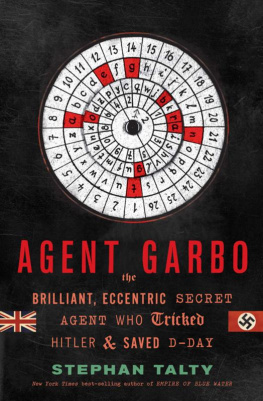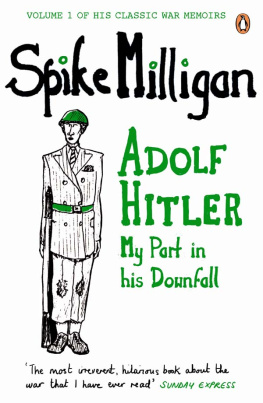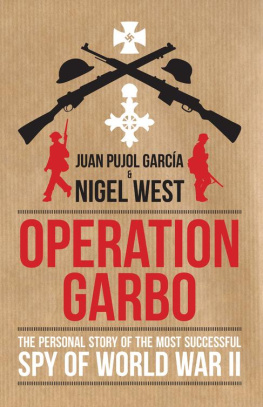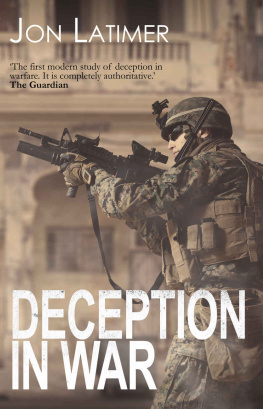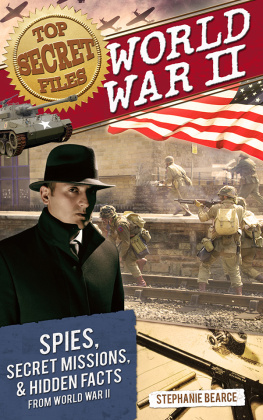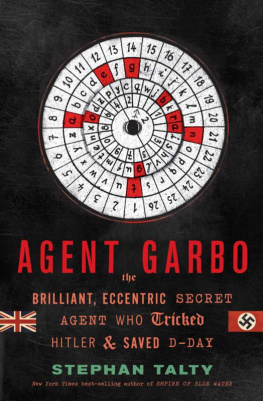Copyright 2012 by Stephan Talty
All rights reserved
For information about permission to reproduce selections from this book, write to Permissions, Houghton Mifflin Harcourt Publishing Company, 215 Park Avenue South, New York, New York 10003.
www.hmhbooks.com
Library of Congress Cataloging-in-Publication Data
Talty, Stephan.
Agent Garbo: the brilliant, eccentric secret agent who tricked Hitler and saved D-Day / Stephan Talty.
pages cm
ISBN 978-0-547-61481-6
1. Pujol, Juan. 2. World War, 19391945Secret serviceGreat Britain. 3. SpiesGreat BritainBiography. I. Title.
D810.S8P883 2012
940.5'8641092dc23
2012005470
Printed in the United States of America
DOC 10 9 8 7 6 5 4 3 2 1
For Alfie Wright,
teacher and friend
Cast of Characters
The Axis
Alfred Jodl: Chief of staff of the German High Command, tasked with implementing Hitlers strategic orders. Executed for war crimes after a trial at Nuremberg.
Friedrich Knappe-Ratey: Code-named Federico, the Abwehr agent who vetted Juan Pujol and was one of his two main contacts in the Madrid station.
Karl-Erich Khlenthal: The second-in-command of the Abwehrs Madrid station and the man who effectively controlled Garbo.
Colonel Baron Alexis von Roenne: The chief intelligence officer for Foreign Armies West.
Erwin Rommel: Nicknamed the Desert Fox, field marshal in the German army who led the Afrika Korps in the Middle East and Army Group B in the defense of occupied France.
Gerd von Rundstedt: Prussian aristocrat and field marshal of the German army who commanded the forces in the West.
The Allies
Johnny Bevan: Former stockbroker and head of the London Controlling Section (LCS); known as the Controller of Deception.
Desmond Bristow: MI6 operative in the Iberian section and the first man to debrief Juan Pujol in London.
Brutus: Roman Garby-Czerniawski, Polish air force captain who became a double agent for the Allies. A key operative in establishing the false Order of Battle during Fortitude South.
Dudley Clarke: Brigadier in the British army, founder of the commando unit A Force and the man who developed many of the theories and practices used by the Allied deception forces.
Tommy Harris: MI5 officer who worked closely with Pujol on the Garbo operation.
Edward Kreisler: Politically connected American entrepreneur and art gallery owner who became Araceli Pujols second husband.
Guy Liddell: MI5s head of counterespionage.
J. C. Masterman: Oxford don and head of the XXor Double CrossCommittee.
Cyril Mills: MI5 officer who was first assigned to Pujol, before being replaced by Tommy Harris.
Kim Philby: MI6 officer who served as head of the Iberian section. Later revealed to have been an agent for the KGB.
Araceli Pujol: Juan Pujols wife and his early co-conspirator.
Juan Pujol: Spanish double agent who worked for MI5 under the code name Garbo.
Gene Risso-Gill: MI6 officer in Lisbon who first interrogated Pujol in 1941.
T. A. Tar Robertson: Intelligence officer who headed up MI5s BiA unit, which managed all double agents in England.
Lieutenant Colonel Robin Tin-Eye Stephens: Head of Camp 020, the interrogation center for suspected Axis spies in south London.
David Strangeways: British army colonel and head of R Force during World War II. Rewrote the Operation Fortitude cover plan and implemented many of its components.
Tate: Wulf Schmidt, the original MI5 double agent, who parachuted into England before being sent to Camp 020 and agreeing to spy for the Allies.
Nigel West: British author and espionage expert, real name Rupert Allason, who rediscovered Juan Pujol in 1984.
Introduction
I N THE MIDDLE of the snowless English winter of 1944, General Dwight D. Eisenhower, the Allied commander overseeing the forthcoming invasion of Europe, was anxious to get the hell out of London. It was January, less than six months before D-Day, and it seemed to him that every Allied officer and VIP in the capital felt personally entitled to barge into his bustling office and bend his ear. The visitors never stopped, interrupting him and his staff, whose typewriters and footsteps and male voices created a constant, purposeful buzz in the rooms at 20 Grosvenor Square. The American ambassador, John Winant, was forever knocking on his door. Churchill was incorrigible. Todayhe glanced down at his appointment bookNoel Wild of Ops (b) was due in, the head of an obscure sector in Eisenhowers sprawling command: deception.
The general had been an early skeptic of deception, the shadow bureau of spies running around the Continent claiming they could fool Hitler and turn the tide of war. General George S. Patton, who much to his own disgust had been drafted into the effort as head of an imaginary one-million-man army called FUSAG, summed up the initial feelings of Eisenhowerand the current attitude of many other military and political leaders: This damned secrecy thing is rather annoying, he wrote, particularly as I doubt if it fools anyone.
Eisenhower had changed his mind about deception after witnessing its effectiveness firsthand in the Mediterranean. But in January 1944 he had many actual objects to worry about: destroyers and French railroads and the landing vessels called LSTs, which were maddeningly scarce and threatened to sink the invasion before it began. These very real and important things, not espionage, were what consumed his days.
As he strode through his headquarters, bald, handsome and electric with physical vigor, Eisenhower appeared confident, a living dynamo of energy, good humor, amazing memory for details, and amazing courage for the future. His staff loved his relentless optimism, but inwardly and in his private letters to Mamie, the general agonized about what was about to happen. He was smoking four packs of Camels a day, and a journalist would later describe him as bowed down with worry... as though each of the stars on either shoulder weighed four tons.
If and when the Allies took the beaches of Normandy, Eisenhower hoped to join them. Going to France would return him to an old haunt. Hed spent a year there that few of his visitors knew about, the idyllic seasons of 192829 when Eisenhowersomewhat slimmer and with more hairtraveled the roads of Bordeaux and Aquitaine with an army driver, eating picnic lunches on the grass borders of country lanes and grating the ears of the farmers with his rudimentary French before winning them over with a flashing smile. That year at the end of the Roaring Twenties had been one of the best of his life. The career officer had been in France to write a guidebook for World War I battlefields and the graveyards of American troops, austere places where the soldiers families came to honor their dead.
It had seemed a pleasant assignment then, but Eisenhowers memories of France had lately attained a darker shading: if D-Day wasnt successful, American cemeteries would sprout around the hills and hedgerows of Normandy like the native wood hyacinths. The French would need acres and acres of rich farmland for the graves of the 101st Airborne alone, more for the young men of the Big Red One; the white crosses would blanket the Norman countryside. Western France would become the graveyard for an entire generation of American GIs, the men that Eisenhower made a point of dashing out to visit every chance he got.
The invasion numbers were daunting. Eisenhower hoped to land five divisions on the first day of the operation. Waiting for him in France and the Low Countries would be fifty-six German divisions. The Fifteenth Army was perhaps the most crucial: it was strung out from Turhout in Belgium (the 1st Panzer Division) to Amiens (the 2nd Panzer Division) and Pontoise in France (the 116th Panzer), place names that Eisenhower knew well. There were ten German armored divisions that were thought to be held as a centrally controlled mobile reserve, whose function would be to drive any invading force back into the sea before it had time to establish a lodgment. The Allies would calculate that most of those reserves would be sent to the Normandy bridgehead within one week of the invasion. That one week, however, was critical.
Next page
